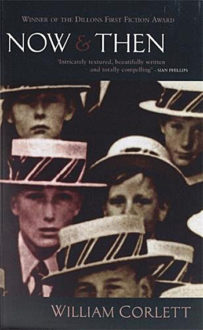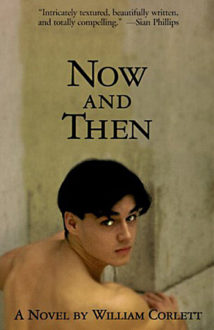 Now and Then
Now and Then
by William Corlett
Published by Abacus
Published July 4, 1996
Fiction
352 pgs. • Find on Amazon.com
Reviewed by Stephen O. Murray
December 21, 2006.
Successful children’s television scenarist turned novelist William Corlett (1938–2005) won the 1995 Dillon First Fiction Award for his Now and Then.
This substantial (346-page) novel is in the British tradition of regretful remembrances of naive youths’ traumatizing betrayals (whether by self as in Michael Frayn’s Spies and the American novelists John Knowles’s A Separate Peace and Matthew Stadler’s Landscape/Memory, or by others as in L. P. Hartley’s The Go-Between and Julian Mitchell’s Another Country, or mostly observed ones as in Evelyn Waugh’s Brideshead Revisited). An emotionally stunted male adult remembers first love whether his youthful self was aware that he was in love at the time or not.
Corlett’s narrator was definitely aware that he was in love—and it was requited and seemingly returned. Christopher (Kit) Metcalf is a 50ish book editor returning “home” for the funeral of his father and finding that his father had kept a box of memorabilia from Kit’s school daze. He has a complicated relationship with a mother who has long been frustrated at how closed-in and solitary her son is and at having herself stayed in her long-running emotionally unfulfilling marriage and an abrasive relationship with a sister who is a monstrous mother of a brood more or less out of Cat on a Hot Tin Roof except British(ed).
The present-tense narration of staying in the childhood home and talking with his mother is juxtaposed to memories of his first love, as a 15-year-old schoolboy during the 1940s, and of betrayal by an older schoolmate whom he idolized, the 17-year-old Adonis, Stephen Walker. It took Kit decades to realize how he had been used (seduced and abandoned for starters), and he had not allowed himself to risk being hurt again. (Not everyone recovers from a broken heart, though everyone’s heart is broken at some time during life.)
It is not easy for Kit to find Stephen again and requires the aid of a former schoolmate Kit loathed. If there weren’t complications, there would not be much of a story of tracking down the long-ago First Love, right?
Kit learns what else was going on both at the boarding school where his covert sexual relationship with Stephen occurred and after Stephen went on to (“up to”) Cambridge (and later). Understanding more about his past and about Stephen provides hope of freeing Kit emotionally.
All literature, cinema, and television supports the position that it is better to have loved and lost than never to have loved at all—even if the beloved was not a worthy object of love, love being famously blind. Kit’s love was at least myopic and he has been emotionally shut down for decades, but he ain’t dead yet…
The notion that self-knowledge, however belatedly achieved, is power and can set one free (the often failed promise of psychoanalysis) may seem a bit pat, but the plotting, the unfolding of the plots, the prose are so compelling that I found the novel enthralling despite having read and seen many other tales of hearts shattered young. Perhaps Corlett’s talents for dialogue were enhanced by writing for television, but there is a satisfying richness and depth that are “novelistic” in the best sense of that adjective.
I read Corlett’s jauntier second novel, Two Gentlemen Sharing, first; it is very funny and could be the basis for a miniseries, as could Now and Then, too.
first appeared on epinions, 21 December 2006
©2006, 2017, Stephen O. Murray


